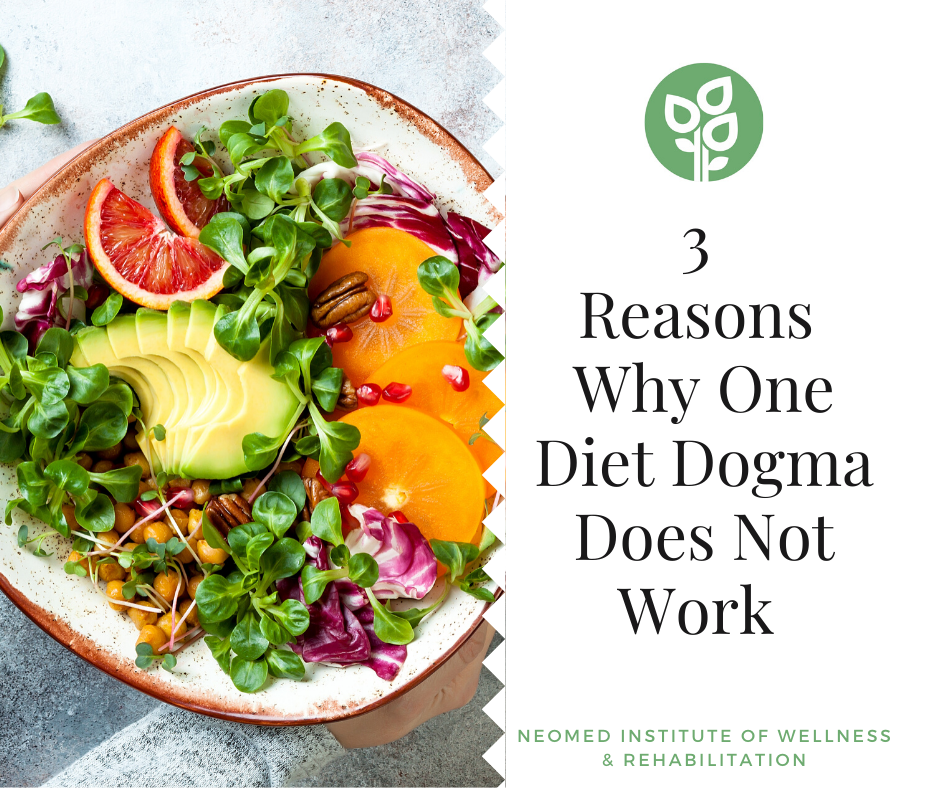3 Reasons Why One Diet Dogma Does Not Work For All
My answer to all of the above questions is, it depends. It depends on the person, what they are going through, what health issues they face, how much stress they are under, and more.

To dissipate the confusion, below I outline 3 reasons why being loyal to one diet dogma does not work:
1. Bio-individuality
One of the foundational lessons in functional medicine is that everyone, regardless of what health issue they are dealing with, should be treated as an individual. Bio-individuality refers to how a person’s genes, environment, life experiences, and emotional status makes this person different from everyone else, even other family members. For example, two people can have autoimmune thyroiditis, but it does not mean that each person will respond the same to a conventional protocol.
As functional medicine practitioners, we are taught to have the patient lead the healing journey and we work together to find practical solutions that will lead them to better health. If a patient does not see benefit from a particular nutrition plan or they have ethical beliefs that do not allow them to follow a specific diet, then alterations in that person’s nutrition journey are changed. If a practitioner would insist on a particular way of eating even after listening to a patient’s complaints, they are not doing the right work to get the patient to feel better.
2. Digestive Health
Most of the chronically ill patients that I see have issues with their digestion. From reflux to constipation, diarrhoea, and bloating, most people have one or all of these issues. If a person with major digestive issues were to just follow a dogma, they may put themselves into a lot of discomfort and pain.
The best way for me to illustrate this is to give an example. If a patient is very toxic, meaning they either have heavy metal toxicity or their detoxification pathways are not working very well AND they suffer from constipation, bloating, and cramping, a raw vegan diet, although a great tool for detoxification, is probably not the best place to begin to resolve gastrointestinal symptoms. This is so because of the high fibre and phytic acid content that raw vegetables contain. The fibre and phytic acid could be very abrasive to an already inflamed gut. In this case, I would have the patient start off with a plant-rich diet, but with all vegetables being cooked along with the addition of bone or vegetable broths to help heal the lining of the intestine. Perhaps, I would even start the person on an elemental diet, eating only soups for the first week to alleviate symptoms. Afterwards, as symptoms improve, I would introduce more raw vegetables along with other foods. In this particular case, following a raw vegan diet right off the bat would have been detrimental to the patient, hindering this person from finding the right solution.
Another example is a patient who may have smelly, floating stools. This is a sign that the liver is not efficiently dumping bile into the small intestines to break down fats. Imagine this person beginning a ketogenic-type diet higher in fat. This person would really suffer because their liver does not work efficiently to break down fat, therefore causing more digestive issues and inflammation. In this case, I would support the liver with various supplements and have the patient eat a plant-rich diet with low to moderate fat from olive oil, avocados, and nuts and seeds (if tolerated). Once liver health is properly addressed, the person can move up to a ketogenic diet if the goals of that person are to increase energy and to lose weight.
3. Different Diets Suit Us Depending On What We Are Going Through Emotionally
If you follow a certain diet or way of doing things and it works, it may not necessarily always work. Stress and our physical and social environment play a big factor in our health. Therefore, if you are adamant about sticking to a diet dogma, you may miss the delicate signs of your body telling you that you may need something else at a specific point in time.
For example, there has been a big trend towards intermittent fasting and fasting altogether in recent years. Although there is merit to using these different tools, it is not necessarily the best idea for various people during different times in their lives.
If someone is under tremendous stress, for instance, fasting can actually do more damage than good. Under times of stress, cortisol interferes with optimal fluctuations of blood sugar, causing people to feel weak and dizzy if they go for more than 4 hours without eating. During times of high stress, intermittent fasting is not recommended. To deal with this increase in cortisol, it is more prudent to eat every three hours mixing good carbs like fruit with some fat and protein, like nuts. A sign that there is less stress in this type of person is that they can go for more hours without eating without any unpleasant side effects. Once they can, intermittent fasting can slowly be introduced.
To continue with the example of stress, people who do a strict low carbohydrate diet when under stress can also feel fatigued and unable to cope with stress. Therefore, under these circumstances, good carbohydrates are recommended to include in the diet as carbohydrates help to decrease cortisol levels. These can include foods like sweet potato, pumpkin, and gluten-free grains like quinoa, buckwheat or brown rice.
Takeaway message: If you have a health condition and you are looking to change your diet, consult with a functional medicine practitioner or a nutritionist knowledgeable in therapeutic diets to help you get back your health. On a personal note, I was a guinea pig myself for years before I started to understand what works for me. When I finally decided to invest in myself and work with the right health care practitioners, this is when I finally understood how to listen to my body and to understand which foods worked best for me.
If you would like to book nutrition or diet consult with us feel free to contact us below:







